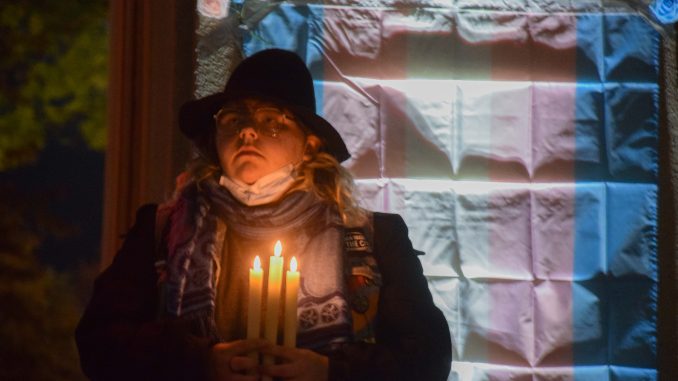
As students and local residents gathered around the Bell Tower Saturday night, Jackson Burke spoke about why observing Transgender Day of Remembrance matters.
“Each year it becomes more and more and more important for us to talk about this,” said Burke, a junior ceramics major and president of Students for Trans Awareness and Rights. “To talk about how many of us are dying, how many of us are being murdered, assaulted or hurt.”
STAR and Queer People of Color co-hosted a candlelight vigil with guest speakers at the Bell Tower on Saturday evening from 6 p.m. to 7 p.m. in remembrance of transgender and gender non-conforming people killed by violent means in 2021. About thirty attendees gathered for the event and appreciated the opportunity to show their support for the transgender community.
Gwendolyn Ann Smith, a transgender activist, created TDOR in 1999 to commemorate Rita Hester, a transgender woman who was killed in 1998, according to GLAAD.
Burke started organizing Transgender Day of Remembrance events with STAR in 2019 to inspire action to protect the transgender community, not just mourn those who have died.
Forty-seven transgender and gender non-conforming people have been fatally shot or killed by other violent means so far in 2021, making this the deadliest year on record for the transgender community, according to Human Rights Campaign.
Burke and other members of STAR set up memorial photos for each life lost this year, arranging them in a half-circle at the base of the Bell Tower facing 13th Street. Electric candles and artificial flowers accompanied the pictures.
STAR members used information from the Human Rights Campaign to write brief descriptions to accompany each memorial photo, Burke said. They also left an extra spot for victims whose deaths were not included, like if they did not openly express their gender identity or were misgendered by authorities.
“I sob every year,” Burke said. “At one point, I break down because all of these people are so young, and it’s so hard hearing about how hopeful they were, what they were doing, what they were looking for in life, and then it was all just taken away.”
John Schoen-McCullough heard about the vigil through Facebook and attended to learn more about TDOR as he had just become aware of it over the past year.
“Reading each individual one, as I did, is very heartwarming,” said Schoen-McCullough, a 2020 liberal studies alumnus. “I like to see just how meaningful they were to people.”
Burke gave the first speech, explaining what TDOR is and how important it is for transgender people and allies to stand together as a community and protect each other.
“You will fight for each other,” he added. “You will give the support you need to each other.”
Claudia Haddad, a Mi’kmaq 72-year-old transgender woman from Canada, followed Burke’s opening remarks with a speech about being a transgender elder.
Haddad was invited to the vigil by her friend Kendall Stephens, one of the event’s organizers and speakers, she said. Haddad hopes students left the vigil with a better understanding of transgender people, she added.
“We’re all people, we’re all alike, we’re all have the same blood,” Haddad said.
The next speaker was Stephens, a transgender activist who said the emphasis on “living your truth” in the transgender community can lead to transgender people losing housing and experiencing social rejection because openly expressing their gender identity leaves them vulnerable to transphobia, she said.
“A lot of us are living in our truth, but when you are experiencing nothing but destruction and death and hopelessness and helplessness and harassment, it almost feels like you’re dying in your truth,” said Stephens, a senior public health and social work major.
Stephens also reflected on how having conversations with people, rather than shutting them down, can help make others more accepting of the transgender community, reflecting on a time where she changed the mind of a man who believed transgender women should not be allowed in women’s restrooms.
“Someone was able to see past my identity, a personal identifier, and see me as a human being, but it took a conversation,” Stephens said. “It took me remaining cool and allowing people to say what’s on they mind.”
Ciora Thomas, the co-vice chair on the Pennsylvania Commission on LGBTQ Affairs and the founder and director of SisTers PGH, a Pittsburgh charity providing housing for homeless transgender people, followed Stephens’ speech.
Thomas spoke about the need to celebrate transgender people while they are still alive and praised the transgender community’s resilience. She also highlighted historical transgender activists like Marsha P. Johnson and Sylvia Rivera, both of whom participated in the Stonewall riots, which started in June 1969 in New York City, New York, when the local transgender community clashed with police officers over harassment and discriminatory laws.
The final speaker was Kelly Burkhardt, the LGBTQ+ liaison and victim/witness coordinator in the Philadelphia District Attorney’s Office. Burkhardt spoke about how people can become allies to the transgender community, and her work tracking down cases involving LGBTQ people and reaching out to LGBTQ victims of crime to see if they need material support.
Dex Downie-Greenidge, Burke and Sean Walsh, a sophomore media studies and production major, concluded the night by reading the names of the 47 transgender and gender non-conforming people who were fatally shot or killed by other violent means this year.
For Downie-Greenidge, a senior honors history major and member of QPOC, reading the names was an emotional experience that made her think about the transgender community’s collective grief over the deaths, she said.
“One thing that people should just think about is there’s a world around you where people are struggling and you don’t even know it,” she said.


Be the first to comment